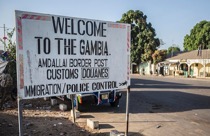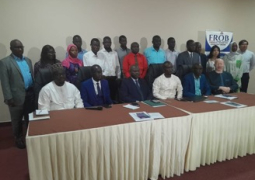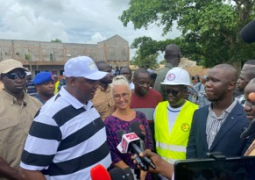
Recently, the International Organisation for Migration (IOM) with the Ministry of Health rolled out an awareness raising campaign with complementary inoculation against Covid-19 targeting mobile populations along The Gambia’s 749-kilometre border with Senegal. The campaign has vaccinated 1,500 people in 60 border communities in the North Bank and Upper River regions since December 2021.
Ebrima Sarr, a groundnut trader told this medium in an interview that when he was crossing the border to Senegal, he was not asked to follow any Covid-19 protocol but upon returning, he was subjected to one protocol which is to wash his hands before entering The Gambian territory.
Sarr added that none of the authorities in either Senegal or Gambia asked him about Covid-19 vaccination certificate.
“I don’t take the Covid-19 vaccine because I never believe the existence of the virus despite one of my friends taking the vaccine and said ‘he didn’t realize any harm’. People traveling within the borderlines have no more respect to Covid-19 protocols and one wouldn’t hear someone talking about it at all,” Mr. Sarr stated.
Ahmed Janneh, a Senegalese driver involved in cross border trading at Amdalai, explained that the pandemic is no longer respected at the borders, adding people have to continue respecting the protocols issued by both Senegal and The Gambia governments.
According to him, it seems the era of Covid-19 has ended at the borders as people move freely around borderlines without being restricted for any Covid-19 regulations.
“For the past two days, we realised that the Gambian authorities made it a must for cross border commuters to wash their hands because of the Islamic convergence that took place in Touba, Senegal, where thousands of worshippers gather every year from different countries.”
He confirmed to this medium that he didn’t take the vaccine, saying “although we were called to be vaccinated but we were as well told that it was not a force and as a result, we decided not to take it,” he said.
Adama Njie, a Gambia trader also highlighted that the Covid-19 doesn’t stop the traders from running their businesses, saying the government restrictions are no longer followed at the border.
She said that she was vaccinated against Covid-19 and has her card but was never asked to show her vaccination certificate.
“The reason is best known to them. Nevertheless, we are glad that challenges at the border regarding Covid-19 have been eased at the highest level and this goes a long way in facilitating our movement freely,” she stated.
Momodou Sowe, a Public Health Officer at the Amdalai Border Post, explained that his ministry is concerned that anybody crossing the border is introduced with certain Covid-19 measures. He said when the Covid-19 started; they normally took travelers' temperature and quarantined them.
At some point, he said, they couldn’t take everyone to quarantine but they were given measures to follow by the ministry, especially hand washing.
“The Gambians coming from Senegal, most of them are vaccinated. Maybe some Senegalese are normally not vaccinated because Senegal’s vaccination campaign is still low and we don’t expect most of them to get the vaccine.”
Sowe buttressed that those coming beyond the borders of Senegal have a protocol that they follow and have to provide a PCR test for less than 72 hours.
He added that those that are fully vaccinated are not subjected to such protocol, and anyone suspected of Covid-19 will be tested at the border. He went on to say that the vaccine is safe despite the challenges they normally face at the border.
Up to date, he said, there are people who don't believe the existence of Covid-19 but we also convince them to understand that the virus is real.
“As long as one cannot travel to certain countries without being vaccinated, I advise the travelers to take the vaccine. As health officers, we will not advocate anything that will bring harm to our people because our responsibility is to make sure everyone is safe. The vaccine has helped a lot in mitigating Covid-19.
This story was produced with support from Journalists for Human Rights (JHR), through its Mobilizing Media in the Fight against COVID-19 in partnership with Kaba Communications and The Point.





